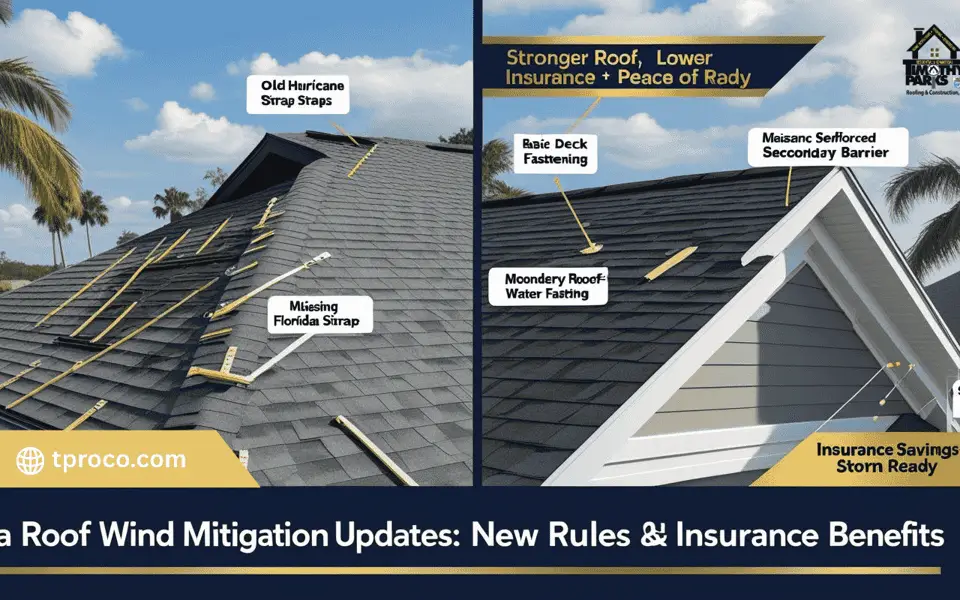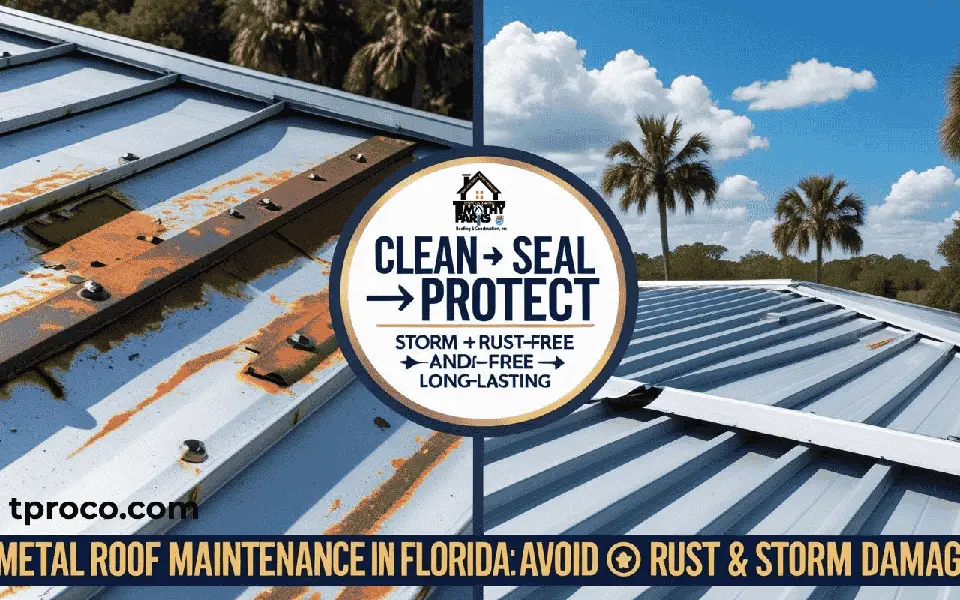Our Blogs
How to Choose the Best Roofing Contractor in Florida: A Complete Guide
When it comes to your home or commercial property, the roof is one of the most critical components. It protects your property from Florida’s unpredictable weather, including heavy rains, hurricanes, and intense heat. Choosing the right roofing contractor ensures that your roof is durable, safe, and compliant with Florida's strict building codes.
With over 4,000 roofing contractors operating in Florida, making the right choice can be overwhelming. This comprehensive guide will walk you through everything you need to know about selecting a professional, reliable, and experienced roofing contractor. By the end of this guide, you'll feel confident about choosing a contractor who will deliver exceptional results.

Why Hiring the Right Roofing Contractor Matters
Hiring a reputable roofing contractor is crucial for several reasons:
- Quality Workmanship: A skilled contractor ensures your roof is installed or repaired correctly, increasing its lifespan and performance.
- Compliance with Building Codes: Florida has strict building codes, especially for hurricane-prone areas. Licensed contractors understand and adhere to these regulations.
- Safety: Roofing work is risky. Professional contractors follow safety protocols and carry insurance to protect both their workers and your property.
- Cost-Effectiveness: While hiring an unlicensed contractor might seem cheaper initially, it often leads to costly repairs in the future due to substandard work.
Key Considerations When Choosing a Roofing Contractor in Florida
1. Verify the Contractor’s License
Florida law requires roofing contractors to hold a valid license issued by the Department of Business and Professional Regulation (DBPR). A licensed contractor has met the state's stringent requirements, which include:
- Passing a trade-specific exam and a Business & Finance exam.
- Having at least four years of industry experience or a combination of education and experience.
- Maintaining insurance coverage for workers’ compensation and general liability.
To confirm a contractor’s license, visit the Florida Roofing Contractor License Search. Hiring a licensed contractor protects you from legal issues and ensures compliance with local and state regulations.
2. Check for Insurance Coverage
Roofing projects can involve accidents or property damage. A reputable contractor will have:
- General Liability Insurance: Covers damages to your property caused by the contractor.
- Workers’ Compensation Insurance: Protects you from liability if a worker is injured on your property.
Always request proof of insurance and verify the details with the insurance provider.
3. Request and Review Written Contracts
A detailed written contract protects both you and the contractor. It should include:
- A full description of the scope of work.
- The materials to be used (including brand and type).
- A project timeline.
- Payment terms and schedule.
Avoid contractors who hesitate to provide a written agreement. Verbal agreements are not enforceable and can lead to misunderstandings.
4. Confirm Building Permit Responsibility
In Florida, roofing contractors are required to obtain a building permit for most projects. This ensures compliance with local building codes and safety standards. The permit should be posted on your property before work begins.
Warning: Never apply for the permit yourself. A reputable contractor will handle this process as part of their service.
5. Research the Contractor’s Experience
Experience matters in the roofing industry, especially in a state like Florida, where roofs must withstand harsh weather conditions. Look for contractors who:
- Have been in business for several years.
- Are familiar with Florida’s building codes and climate challenges.
- Specialize in the type of roofing service you need, whether it's residential, commercial, or storm damage repair.
6. Compare Multiple Bids
Get written estimates from at least three contractors. When comparing bids, look beyond the price. Consider:
- The materials they propose to use.
- The scope of work outlined in the bid.
- Warranties offered for materials and labor.
Choosing the lowest bid isn’t always the best option. Focus on value and quality to ensure long-term satisfaction.
7. Ask for References and Check Reviews
Reputable contractors will happily provide references from past clients. Contact these references to learn about their experience with the contractor. Additionally:
- Check online reviews on platforms like Google, Yelp, and the Better Business Bureau.
- Look for patterns in feedback. Consistent praise for quality and professionalism is a good sign, while repeated complaints should raise red flags.
8. Avoid High-Pressure Sales Tactics
Be wary of contractors who pressure you into making immediate decisions or signing contracts on the spot. Take your time to review your options and make an informed choice.
Common Roofing Scams to Watch Out For
1. Storm Chasers
After hurricanes or severe storms, unlicensed contractors often target homeowners with offers of cheap repairs. These “storm chasers” usually perform subpar work and disappear, leaving homeowners with unresolved issues.
2. Unrealistic Low Prices
If a deal seems too good to be true, it probably is. Contractors offering unusually low prices might cut corners on materials or labor quality.
3. Lack of Documentation
Avoid contractors who refuse to provide written estimates, licenses, or proof of insurance. A lack of documentation is a major red flag.
Understanding Florida’s Roofing License Requirements
To legally operate in Florida, roofing contractors must meet the following licensing requirements:
- Exams: Pass a state-administered Business & Finance exam and a Trade-specific exam.
- Experience: Have a minimum of four years of roofing experience, with some allowance for education.
- Insurance: Maintain general liability and workers’ compensation insurance.
- Background Check: Pass a background check and provide a credit report.
Working with an unlicensed contractor can result in fines, legal issues, and subpar workmanship.
Popular Roofing Materials in Florida
1. Asphalt Shingles
- Pros: Affordable, durable, and available in various styles and colors.
- Cons: Shorter lifespan compared to other materials.
- Best For: Residential homes.
2. Tile Roofs
- Pros: Long-lasting, heat-resistant, and aesthetically appealing.
- Cons: Higher upfront cost and weight require reinforced roofing structures.
- Best For: Homes in areas prone to extreme heat and rain.
3. Metal Roofs
- Pros: Energy-efficient, durable, and able to withstand strong winds.
- Cons: Higher initial cost.
- Best For: Both residential and commercial properties.
4. Flat Roofs
- Pros: Easy to maintain and repair, energy-efficient with reflective coatings.
- Cons: Prone to water pooling without proper drainage.
- Best For: Commercial and industrial buildings.
Why Choose Timothy Parks Roofing & Construction Inc.?
At Timothy Parks Roofing & Construction Inc., we pride ourselves on delivering top-notch roofing services across Central Florida. Here’s why we’re the right choice:
- Licensed Professionals: We meet all Florida licensing requirements, ensuring compliance with state regulations.
- Insurance Coverage: Our team is fully insured for your peace of mind.
- Experienced Team: With years of experience in residential and commercial roofing, we understand Florida’s unique challenges.
- High-Quality Materials: We use premium materials that meet Florida Building Code standards, ensuring durability and performance.
- Customer-Focused Approach: Your satisfaction is our priority. From initial consultation to project completion, we’re here to guide you every step of the way.
How to Get Started
Step 1: Research and shortlist contractors using the criteria outlined in this guide.
Step 2: Schedule consultations and request detailed estimates.
Step 3: Review contracts carefully and choose a contractor who aligns with your needs and budget.
Final Thoughts
Choosing the right roofing contractor in Florida requires time and research, but the effort pays off in the form of a durable, well-installed roof. By verifying licenses, insurance, and references, and avoiding common scams, you can ensure that your roofing project is handled by a professional who prioritizes quality and safety.





